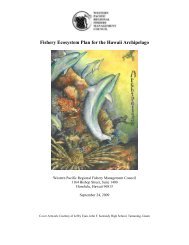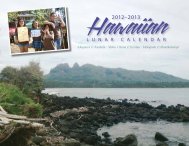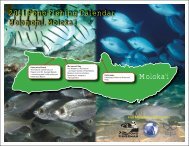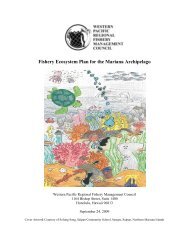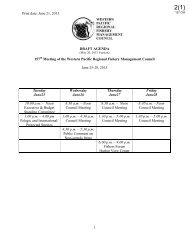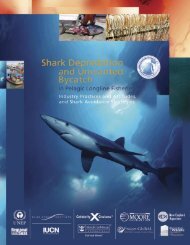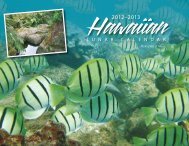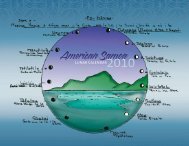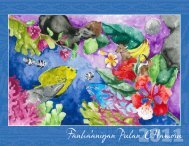PROCEEDINGS OF THE FOuRTH INTERNaTIONal FISHERS FORum
PROCEEDINGS OF THE FOuRTH INTERNaTIONal FISHERS FORum
PROCEEDINGS OF THE FOuRTH INTERNaTIONal FISHERS FORum
Create successful ePaper yourself
Turn your PDF publications into a flip-book with our unique Google optimized e-Paper software.
[ 6.2. ]<br />
Keynote Address<br />
Reducing bycatch in longline<br />
fisheries as a step towards<br />
keeping jobs, protecting nature<br />
and building a market<br />
James P. Leape<br />
Director General, WWF-International<br />
Fishing provides an essential food source as well as<br />
livelihoods for millions of people. Yet many of the world’s<br />
fisheries are close to collapse and have serious impacts on<br />
marine ecosystems. It is the health of these ecosystems<br />
which provides a sustained catch and a living for fishers.<br />
In many parts of the world damaging fishing practices, such<br />
as unfettered bycatch, poor management, such as too many<br />
vessels in a fishery, or not heeding scientific advice, are<br />
leading to the depletion of stocks, degradation of the ocean<br />
and the devastation of communities. Market demand, weak<br />
governance, and harmful government subsidies all fuel these<br />
damaging practices.<br />
This does not, however, have to be the future for fisheries.<br />
Many countries, companies and fishers are changing<br />
the way the fishing sector does business. For example:<br />
ASOEXPEBLA, the Ecuadorian association of white fish<br />
exporters and FENACOPEC, the Ecuadorian Federation<br />
of Fisherman Co-ops, are championing the transformation<br />
of their fleets toward sustainability—starting by using<br />
circle hooks to avoid the bycatch of turtles. Walmart has<br />
pledged to buy seafood only from MSC certified sources.<br />
The longline fishers of Oaxaca in Mexico are willing to test<br />
circle hooks and join the hundreds of fishermen willing to<br />
be best practitioners of sustainable fishing operations, such<br />
as CANIP, the Costa Rican Longline Industry Association,<br />
and many individual fishermen and companies in Central<br />
America, Colombia and Peru have done. Finally, the<br />
government of Costa Rica is planning to reduce the footprint<br />
of its fleets in order to combat the impact of climate change.<br />
Several fisheries in the Central American region are shining<br />
examples of the types of reforms that are needed if the sector<br />
is to prosper and even survive.<br />
WWF, together with partners at the local level and in<br />
industry, have already launched cooperative experiments<br />
with longline fleets on both sides of the Pacific, with over<br />
100,000 circle hooks tested and evaluated through 10 cycles<br />
each, for a total of one million tests in the water, and have<br />
an ongoing voluntary observer program. A regional database<br />
is in place, a structure without precedence at this scale.<br />
A regional, multi-stakeholder alliance including industrial<br />
and artisanal fisherfolk, government agencies, NGOs, and<br />
regional management authorities is driving the up-take of best<br />
practices in longlining. WWF is at the forefront of engaging<br />
with the fisheries sector in the precise way in which it adopts<br />
new technologies and practices, building the case together for<br />
incentive-driven fisheries change—and we are committed to<br />
delivering this change in partnership with the fishing industry.<br />
It is clear that there is another way than to deplete fisheries<br />
and damage the ocean’s health. Retailers and consumers<br />
are demanding that seafood comes from sustainable and<br />
non-damaging fisheries. Forward thinking fishers are seeing<br />
this as an opportunity, both to gain access to markets but<br />
also as a tool to increase the sustainability of their catch and<br />
therefore their income. Enlightened governments, through<br />
legislation and good management need to ensure reforms are<br />
supported, that those that do the right thing are protected,<br />
and that the health and productivity of the oceans is restored.<br />
Today WWF is working with retailers, processors, fishers<br />
and resource managers under a shared vision of sustainable<br />
fishing. This is a vision of empowered fishers free to make<br />
choices about the best way to continuously improve<br />
their fishing because they know that they will benefit<br />
economically. This is a vision where consumers do not have<br />
to avoid buying swordfish or tuna because of a bycatch issue;<br />
instead all the choices in the fish market are caught using the<br />
best available practices (sustainably). This is a vision where<br />
scientists monitor and assess fishing impacts, and based<br />
on that science, authorities set strict quotas that allow for<br />
a healthy marine ecosystem and thus a productive fishery.<br />
WWF pledges to support those that wish to work with us<br />
to achieve this vision, both with practical assistance and<br />
political leverage where we can.<br />
Keynote Address<br />
25



